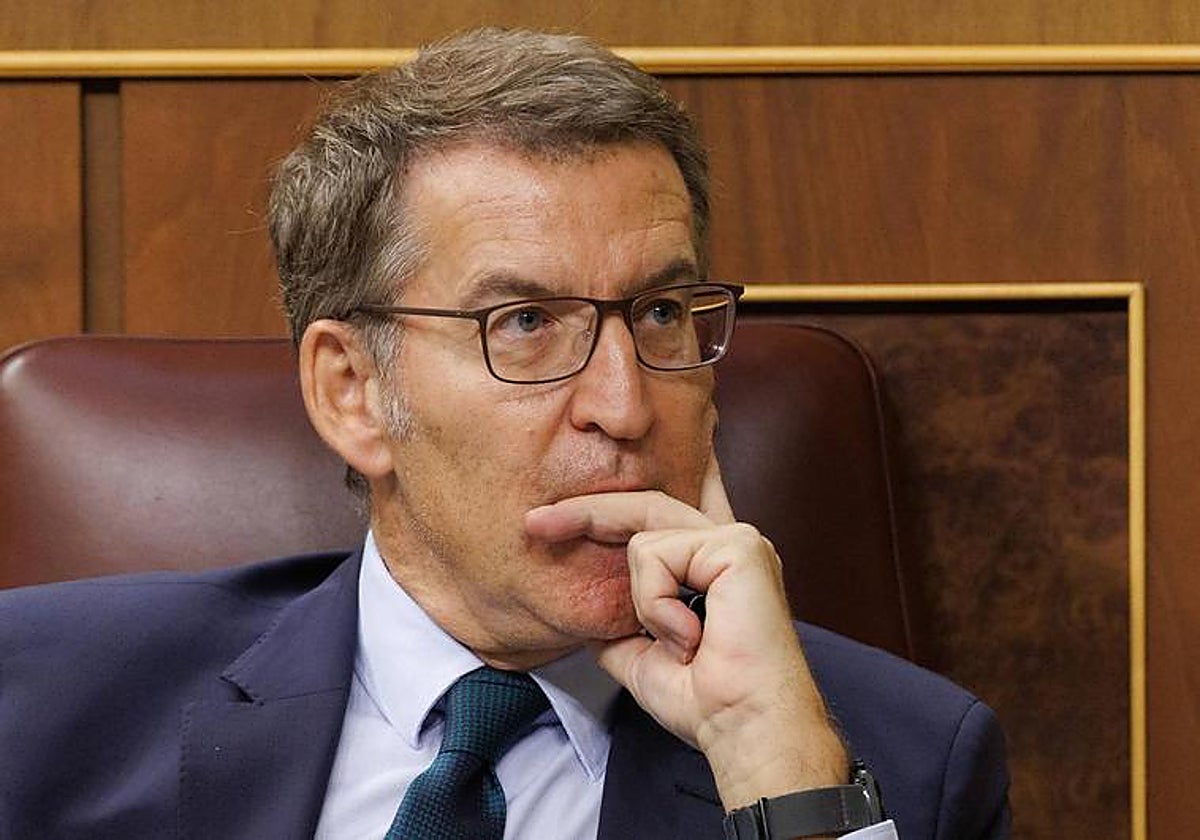Feijóo loses investiture vote in Spain and challenges Sánchez to return to polls with Catalan amnesty on his agenda
Puente, who once again spoke for the acting prime minister, ignored the challenge and accused the PP leader of using the Head of State to strengthen his internal leadership
Paula De las Heras
Madrid
Friday, 29 September 2023, 17:04
He did not get a single vote more than in Wednesday's vote. Alberto Núñez Feijóo received today (Friday, 29 September) the definitive rejection of the Congress of Deputies with 172 votes in his favour from PP, Vox, UPN and CC; and 177 against from PSOE, Sumar, Junts, ERC, Bildu, PNV, BNG and one null vote from Eduard Pujol.
The last day of Feijóo's failed investiture was preceded by the agreement reached the day before by Junts and ERC in the Catalan Parliament to make their support for Sánchez conditional on him giving a commitment "to make effective the conditions for holding the referendum" and to which the PSOE and the PSC were forced to respond with an unusual communiqué in which, without expressly mentioning the referendum and with somewhat ambiguous words, they showed their rejection of any proposal that would deepen "rupture and discord".
In the plenary session itself, this Friday, the Republicans changed their spokesperson and, instead of Gabriel Rufián, an advocate of dialogue, they opted for Teresa Jordá, who is much more belligerent. The former minister of the Generalitat (first with Quim Torra and then Pere Aragonès) insisted that "once the amnesty has been achieved, it is time to open a phase of negotiation and definitively set the conditions for Catalonia to be able to vote". The spokesperson for Junts, Míriam Nogueras, warned: "Some still argue that a referendum will break up coexistence. But voting is not dividing, in Catalonia it is consensus."
Against this backdrop, Feijóo recalled that in the last legislature, the current acting prime minister said in the Congress that there would be no amnesty or referendum. And he challenged him to repeat it. "Come up and speak clearly and bluntly, without statements at eight o'clock in the evening, full of euphemisms. Go up and explain what Spain is going to have to endure if you are prime minister of the government. Have the courage you did not have on Tuesday and take the floor".
Challenge
The leader of the opposition said that the erasure of the crimes of the 'procés' – which Junts and ERC demand, and which, according to the words of the head of the executive himself, the socialists are now willing to agree to in exchange for his re-election – was not part of the PSOE's programme or discourse two months ago. "On the contrary. They pledged not to do it. If you want to do it, achieve it at the ballot box, with transparency and clarity. Achieve it by letting Spaniards decide," Feijóo said.
Neither challenge was met with a response. Sánchez did not take the podium. He again delegated his response to what is perhaps the socialist deputy with the most provocative profile, the former Mayor of Valladolid, Óscar Puente. The latter, in turn, again ignored the framework set by the PP president and went on the attack with harsh accusations, such as that of having "used the highest institution of the State, the Crown" and phrases loaded with irony. "You entered this House as a candidate for leader of the opposition and it seems that you are going to leave as such, as leader of the opposition, at last", he said, alluding to the perception that Feijóo has strengthened his internal leadership with his speeches in the investiture.
Puente said that Feijóo has wasted Spaniards' time with a debate that he knew he had lost beforehand, and that to do so he has not hesitated to erode the Head of State. The PP secretary general, Cuca Gamarra, responded to the accusation in her turn, recalling the first investiture, which Sánchez ran for with only 131 votes in favour and lost, the second, with 124, and the third with 167.
Once the vote was over, the President of the Congress, Francina Armengol, will go to the Zarzuela Palace to communicate the result to the king. During the Plenary session the ERC spokeswoman accused the king of "having taken sides again, as always" for having proposed Feijóo, leader of the most voted force on 23 July, as a candidate for investiture. Next week, the king is expected to open a new round of contacts with the political groups, which will presumably not be attended, as happened in August, by neither the Republicans nor Bildu nor Junts or the BNG, four of Sánchez's possible partners.
What can be expected is that, at the end of this round, Felipe VI will propose the investiture of the PSOE leader. Socialist sources suggest that the decision on when Sánchez may meet with Armengol to set the date for the plenary session in which he would ask for the confidence of the House may be delayed. In any case, the acting head of the executive has just under two months to secure all the necessary support to remain in power. On 27 November, if he has not succeeded, general elections will automatically be called. In that case, the election would take place on 14 January.
